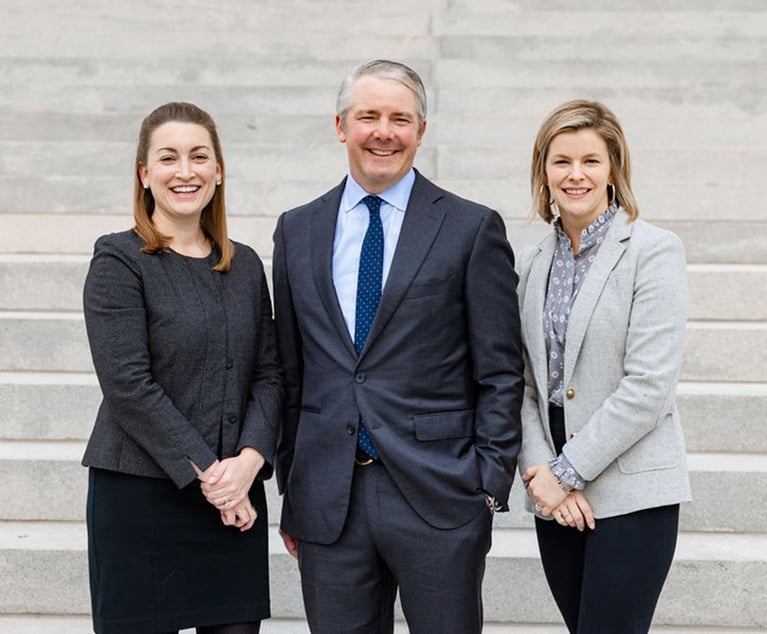 Judge Richard Leon of the U.S. District Court for the District of Columbia. Photo: Diego M. Radzinschi/The National Law Journal
Judge Richard Leon of the U.S. District Court for the District of Columbia. Photo: Diego M. Radzinschi/The National Law Journal CVS-Aetna Judge, Airing Concerns, Cautions Against Quickly Combining Operations
U.S. District Judge Richard Leon said it would be “more than reasonable” for CVS and Aetna to keep their businesses separate while he reviews the acquisition. Leon on Monday appointed a monitor in connection with the deal, whose completion was executed last week.
December 03, 2018 at 02:15 PM
5 minute read
A federal judge agreed Monday to appoint an outside lawyer to monitor CVS Health Corp.'s acquisition of Aetna Inc. but raised continued concerns about the two companies integrating their businesses while the $69 billion deal remains under his review.
U.S. District Judge Richard Leon in Washington, D.C., suggested CVS's management should be insulated from Aetna's while he weighs approving the companies' settlement with the Justice Department, which cleared the acquisition on the condition the insurance giant sell off its independent prescription drug plan business.
Leon said it would be “more than reasonable” for CVS and Aetna to keep their businesses separate while he reviews the acquisition. The two companies announced the completion of their deal last week.
The judge last week shared his concerns about the merger after initially declining to rule on the Justice Department's request to have Julie Myers Wood, chief executive of the monitoring firm Guidepost Solutions, oversee the sale of Aetna's individual prescription drug plan business to Wellcare Health Plans Inc. Leon on Monday approved Wood as the monitor and spoke for only a few minutes before setting a hearing for Dec. 18.
“See you on the 18th,” he said, before stepping off the bench without questioning the Justice Department lawyers and counsel for Aetna and CVS.
Makan Delrahim, the assistant attorney general in charge of the Justice Department's antitrust division, attended Monday's hearing. Delrahim declined to comment after it. CNN reported last week that Delrahim is among the contenders for the U.S. attorney general nomination.
At last week's hearing, which many had expected to be routine, Leon said he had been struck by the government's request to appoint a compliance monitor, saying that it made him feel as though he were “being kept in the dark, kind of like a mushroom.”
Leon, who approved AT&T's contested acquisition of Time Warner in June, pointed out that those two companies have closed their deal but refrained from integrating their operations while the Justice Department challenges his ruling in the U.S. Court of Appeals for the D.C. Circuit.
When Leon asked Justice Department lawyer Jay Owen last week whether he was familiar with that arrangement in the AT&T case, Owen replied, “No, your honor, I'm not.”
“You need to talk to your colleagues more frequently, Mr. Owen. CVS and Aetna know. The deal closed pending my ruling, but the parties agreed that the companies wouldn't be integrated until after the appeal was resolved by the D.C. CIrcuit,” Leon said, referring to AT&T and TIme Warner. “[Aetna and CVS] know that, and I can't believe you don't.
“What are you, a mushroom yourself over in the antitrust division?” Leon asked during one exchange.
Leon accused the Justice Department and the two companies of treating his review of the acquisition as a “rubber stamp operation,” raising the specter that he would strike down the deal on antitrust grounds. Appearing irate at times, he noted the public comment period on the deal had not yet closed, pointed specifically to the American Medical Association's opposition to the acquisition, and expressed concern about how CVS and Aetna would be unwound in the event that he ruled against their merger.
“Let's make it clear, Mr. Owen: This court's not a rubber stamp,” Leon said.
“No, your honor, I don't believe this court is a rubber stamp,” Owen responded.
“Yeah, I understand you don't,” Leon replied. “God knows if the antitrust division has learned anything, they know that this court is not a rubber stamp. But these folks over here need to understand that too, because it's their clients who think I am a rubber stamp, and that's not going to be tolerated.”
Ahead of Monday's hearing, the Justice Department defended CVS and Aetna's move to begin integrating their operations and said an earlier order—signed by Leon in October—had allowed the companies to consummate their merger.
Government lawyers argued that while federal law gives judges power to review merger settlements, it does not “prohibit companies from consummating their merger” and integrating operations while a court review is pending.
“Allowing companies to consummate a proposed merger before a settlement has received final approval is common in consent decrees with the United States and the Federal Trade Commission,” Justice Department lawyers wrote in a court filing Sunday.
The government said it was “particularly critical” for Aetna to complete the sale of its prescription drug plan business to Wellcare.
Insurers, the Justice Department said, “have already begun planning their bids for the 2020 plan year, so transferring the assets to WellCare as soon as possible was necessary to ensure that it could step into Aetna's shoes and preserve the competition that would otherwise be lost as a result of the merger.”
|Read more:
This content has been archived. It is available through our partners, LexisNexis® and Bloomberg Law.
To view this content, please continue to their sites.
Not a Lexis Subscriber?
Subscribe Now
Not a Bloomberg Law Subscriber?
Subscribe Now
NOT FOR REPRINT
© 2025 ALM Global, LLC, All Rights Reserved. Request academic re-use from www.copyright.com. All other uses, submit a request to [email protected]. For more information visit Asset & Logo Licensing.
You Might Like
View All
‘Issue of First Impression’: New York Judge Clears Coinbase Appeal Amid Crypto Regulatory Clash
4 minute read
DC's Birchstone Moore Combines With Chicago-Founded Wealth Planning Firm
3 minute read

Trending Stories
Who Got The Work
Michael G. Bongiorno, Andrew Scott Dulberg and Elizabeth E. Driscoll from Wilmer Cutler Pickering Hale and Dorr have stepped in to represent Symbotic Inc., an A.I.-enabled technology platform that focuses on increasing supply chain efficiency, and other defendants in a pending shareholder derivative lawsuit. The case, filed Oct. 2 in Massachusetts District Court by the Brown Law Firm on behalf of Stephen Austen, accuses certain officers and directors of misleading investors in regard to Symbotic's potential for margin growth by failing to disclose that the company was not equipped to timely deploy its systems or manage expenses through project delays. The case, assigned to U.S. District Judge Nathaniel M. Gorton, is 1:24-cv-12522, Austen v. Cohen et al.
Who Got The Work
Edmund Polubinski and Marie Killmond of Davis Polk & Wardwell have entered appearances for data platform software development company MongoDB and other defendants in a pending shareholder derivative lawsuit. The action, filed Oct. 7 in New York Southern District Court by the Brown Law Firm, accuses the company's directors and/or officers of falsely expressing confidence in the company’s restructuring of its sales incentive plan and downplaying the severity of decreases in its upfront commitments. The case is 1:24-cv-07594, Roy v. Ittycheria et al.
Who Got The Work
Amy O. Bruchs and Kurt F. Ellison of Michael Best & Friedrich have entered appearances for Epic Systems Corp. in a pending employment discrimination lawsuit. The suit was filed Sept. 7 in Wisconsin Western District Court by Levine Eisberner LLC and Siri & Glimstad on behalf of a project manager who claims that he was wrongfully terminated after applying for a religious exemption to the defendant's COVID-19 vaccine mandate. The case, assigned to U.S. Magistrate Judge Anita Marie Boor, is 3:24-cv-00630, Secker, Nathan v. Epic Systems Corporation.
Who Got The Work
David X. Sullivan, Thomas J. Finn and Gregory A. Hall from McCarter & English have entered appearances for Sunrun Installation Services in a pending civil rights lawsuit. The complaint was filed Sept. 4 in Connecticut District Court by attorney Robert M. Berke on behalf of former employee George Edward Steins, who was arrested and charged with employing an unregistered home improvement salesperson. The complaint alleges that had Sunrun informed the Connecticut Department of Consumer Protection that the plaintiff's employment had ended in 2017 and that he no longer held Sunrun's home improvement contractor license, he would not have been hit with charges, which were dismissed in May 2024. The case, assigned to U.S. District Judge Jeffrey A. Meyer, is 3:24-cv-01423, Steins v. Sunrun, Inc. et al.
Who Got The Work
Greenberg Traurig shareholder Joshua L. Raskin has entered an appearance for boohoo.com UK Ltd. in a pending patent infringement lawsuit. The suit, filed Sept. 3 in Texas Eastern District Court by Rozier Hardt McDonough on behalf of Alto Dynamics, asserts five patents related to an online shopping platform. The case, assigned to U.S. District Judge Rodney Gilstrap, is 2:24-cv-00719, Alto Dynamics, LLC v. boohoo.com UK Limited.
Featured Firms
Law Offices of Gary Martin Hays & Associates, P.C.
(470) 294-1674
Law Offices of Mark E. Salomone
(857) 444-6468
Smith & Hassler
(713) 739-1250










